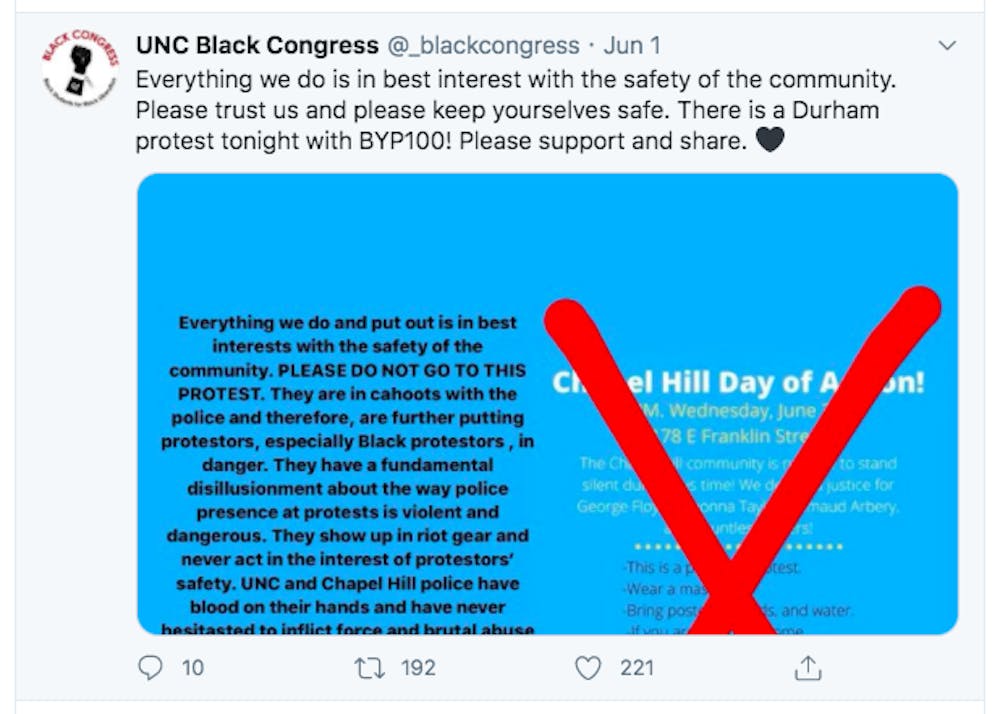D’atra Jackson, the national director for BYP100, said the group’s Durham chapter leads the coalition Durham Beyond Policing, which organized the June 1 protest.
She said the protest was an extension to previous advocacy for city leaders to change policy to divert funding from police and invest in community-based alternatives.
Jackson said it was sheer coincidence there were some police cars blocking off the streets for the BYP100 protest, and Durham Police was not contacted before the protest.
“We never contact the police,” Jackson said. “Ever.”
Jackson said BYP100 organizers don’t contact police about planned protests or rallies as a way of showing solidarity and to respect safety concerns of Black attendees.
“We’ve just had too many instances where the police are called in to diffuse the situation and end up escalating it to the point where someone is murdered,” Jackson said. “We don’t call the police, we especially don’t call them before we do any demonstrations, because it wouldn’t help us.”
At the June 3 protest, Chapel Hill Police Chief Chris Blue said he recognizes why some protesters may be uncomfortable with a large police presence, and organizers stressed the importance of minimizing police presence to make sure protesters were comfortable.
“They also wanted to be sure that it would be safe for them to walk in the street, and we would help keep them safe, and that’s our goal today, to help keep them safe and to help preserve an environment where we can have a healthy, safe, productive conversation," Blue said.
Charles said beyond his initial concerns of preserving safety and blocking off roads for marching, contacting police was also a way to open up a conversation between activists and law enforcement.
“My biggest priorities were: one, making sure everyone was safe, and two, making sure we can have an open conversation and communication with the police department,” Charles said. “Both the UNC and Chapel Hill police departments expressed their solidarity for this protest and were pretty on board with change and understanding that reform and justice do need to happen.”
According to the Chapel Hill Police Department’s Policy Manual, a document last revised in 2018, CHPD is “committed” to eliminating any kind of bias-based policing, and does not endorse or support any type of bias, stereotyping or racial profiling by its officers.
The Black Congress spokesperson said at UNC specifically, many Black students and leaders have had negative, even dangerous interactions with local and campus police.
To get the day's news and headlines in your inbox each morning, sign up for our email newsletters.
“As members of Black Congress, the police have never shown any kind of interest in people's safety, especially Black protesters,” the spokesperson said. “They’re very ‘show up in riot gear,’ they’re very hyper-aware, very hyper-alert, they’re ready for something to happen so that they can enforce it.”
Jackson said differences in police response to Black protesters and white protesters are visible across the state and nation. Specifically, she referenced differences in Raleigh Police Department’s responses to ReopenNC protests and Black Lives Matter protests in recent weeks.
“We see unarmed protesters, Black people, be harassed, and force be used to control them, whether it’s kettling, or using loud sounds, tear gas, pepper spray, all of that as disbursement and extinguishing tools,” Jackson said.
According to the Chapel Hill Police Department’s Policy Manual, officers will give a verbal warning "if feasible" before using pepper spray or “chemical munitions,” and all officers who deploy less lethal force weapons like tear gas and pepper spray must have completed department-mandated training.
At the June 3 protest, Chapel Hill Police Chief Chris Blue said his main concern was to keep protesters safe without tear gas or any other less lethal force. However, Blue said police departments must have plans in place, even plans of force, in case protests escalate.
“We do have to prepare for the very real possibility, that although most people want to be peaceful and express themselves, maybe there are some who want to do harm to others,” Blue said.
Jackson said police are trained to respond with force to any perceived threat, and this training puts protesters, especially Black protesters, in danger.
“They are not trained to de-escalate, nor are they trained to treat people like people,” Jackson said. “They’re trained to protect and control by using force, and that includes our demonstrations but especially ones where Black people will be seen.”
As of June 4, over 10,000 protesters had been arrested across the U.S., and less lethal force has been used at protests across N.C.
Although no one was arrested at either Chapel Hill protest, the UNC Black Congress spokesperson said as organizers continue through this movement, they need to prioritize the safety of Black protesters by recognizing the potentially fatal risk of contacting police.
“Black lives matter, and the fact that Black lives acknowledge that police do not provide safety, that’s kind of the fundamental,” the spokesperson said. "So, if doing so is not providing safety, we need to resist against that. We need to organize events and protests that are in the best interests of people that we’re fighting for and fighting with.”
@sclaire_perry
@DTHCityState | city@dailytarheel.com




